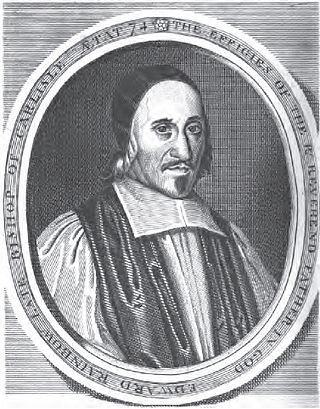Related Research Articles

Francis Henry Egerton, 8th Earl of Bridgewater,, known as Francis Egerton until 1823, was a noted British eccentric from the Egerton family and supporter of natural theology.

Edward Rainbowe or Rainbow (1608–1684) was an English academic, Church of England clergyman and a noted preacher. He was Master of Magdalene College, Cambridge, Vice-Chancellor of the University of Cambridge and Bishop of Carlisle.

Thomas Percy was Bishop of Dromore, County Down, Ireland. Before being made bishop, he was chaplain to George III of the United Kingdom. Percy's greatest contribution is considered to be his Reliques of Ancient English Poetry (1765), the first of the great ballad collections, which was the one work most responsible for the ballad revival in English poetry that was a significant part of the Romantic movement.

Henry King was an English poet who served as Bishop of Chichester.
William Fuller was dean of Ely and later dean of Durham. He was in serious trouble with parishioners and Parliament during the early 1640s.

Thomas Thurlow (1737–1791) was an English bishop.

All Saints' Church is the ancient parish church of Fulham, in the County of Middlesex, pre-dating the Reformation. It is now an Anglican church in Fulham, London, sited close to the River Thames, beside the northern approach to Putney Bridge. The church tower and interior nave and chancel are Grade II* listed.
Henry Edward John Howard was an English Anglican clergyman who was Dean of Lichfield.

John May (Meye) was an English academic and churchman, who became Bishop of Carlisle. He also served the House of De Vere as cleric in Buckinghamshire.

Thomas Dampier served as Bishop of Rochester and Bishop of Ely.

Charles Lyttelton (1714–1768) was an English churchman and antiquary from the Lyttelton family, who served as Bishop of Carlisle from 1762 to 1768 and President of the Society of Antiquaries of London from 1765 to 1768.

Hon. Hugh Percy was an Anglican bishop who served as Bishop of Rochester (1827) and Bishop of Carlisle (1827–56).

Robert Plumptre (1723–1788) was an English churchman and academic, President of Queens' College, Cambridge from 1760.

William Cole, was a Cambridgeshire clergyman and antiquary, known for his extensive manuscript collections on the history of Cambridgeshire and of Buckinghamshire.
Admiral Sir Charles Ekins GCB was an officer of the Royal Navy who served in the Fourth Anglo-Dutch War, the French Revolutionary and Napoleonic Wars, and rose to the rank of admiral.
Denis Granville was an English non-juring cleric, Dean of Durham and then Jacobite exile.
Thomas Zouch, was an English clergyman and antiquary, best known as a student of the works and life of Izaak Walton.

William Cooke (1711–1797) was an English cleric and academic, Provost of King's College, Cambridge from 1772 and Dean of Ely from 1780.
Spencer Madan (1758–1836) was an English cleric, known as a translator of Hugo Grotius.
William Hayward Roberts was an English born schoolmaster, poet and biblical critic, cleric and Provost of Eton College.
References
- ↑ "Ekins, Geoffrey (EKNS717G)". A Cambridge Alumni Database. University of Cambridge.
- . Dictionary of National Biography . London: Smith, Elder & Co. 1885–1900.
- Fasti Ecclesiae Anglicanae 1541-1857: volume 11: Carlisle, Chester, Durham, Manchester, Ripon, and Sodor and Man dioceses
This article relies largely or entirely on a single source .(January 2011) |